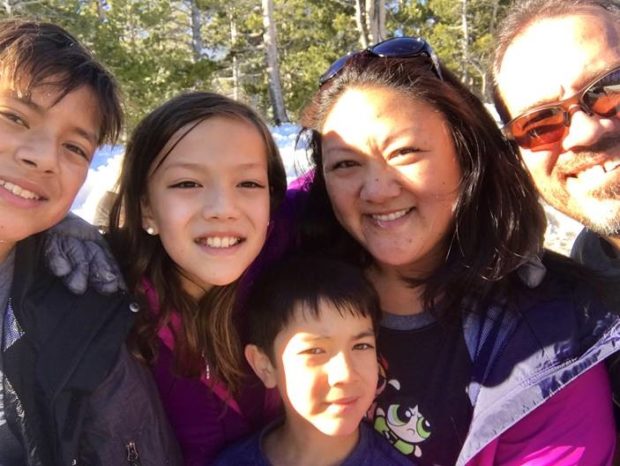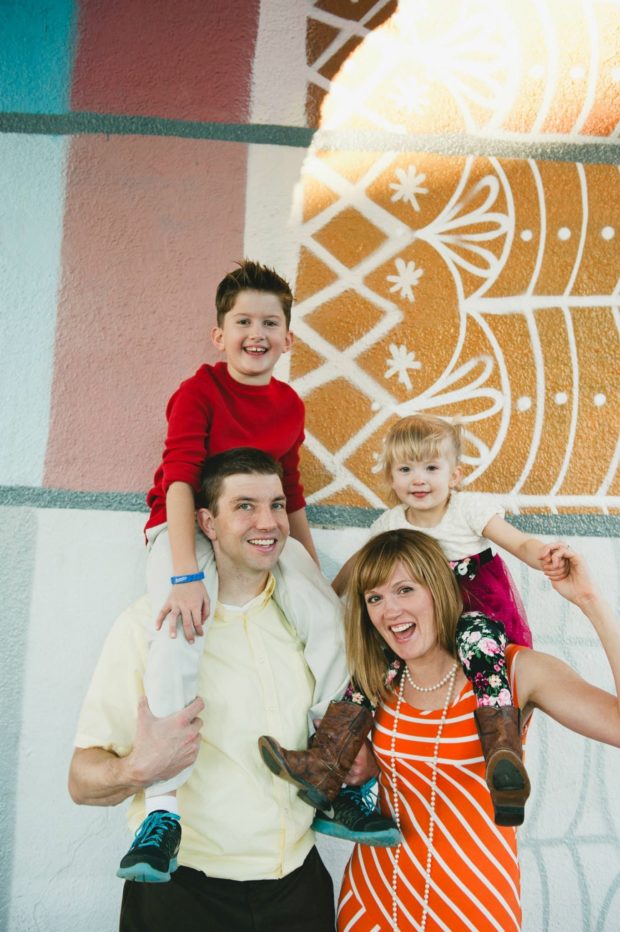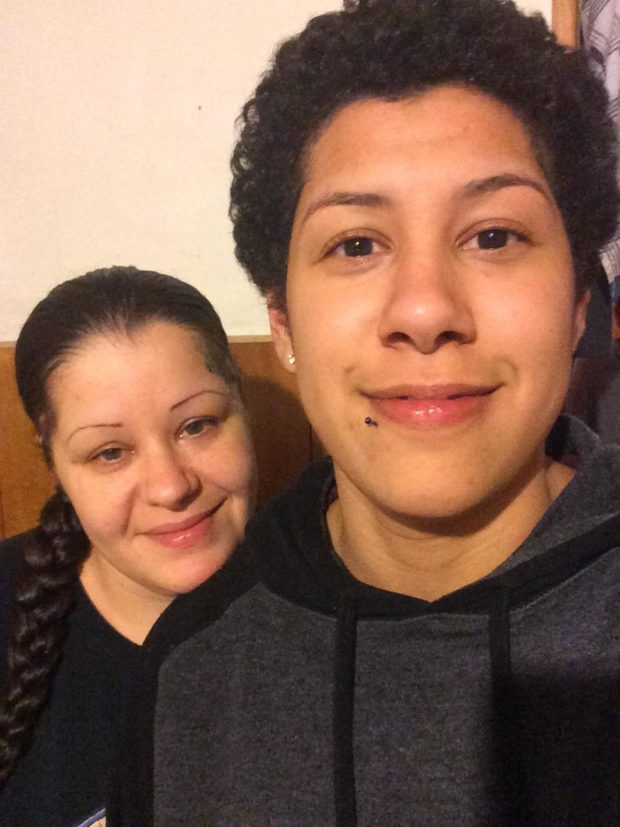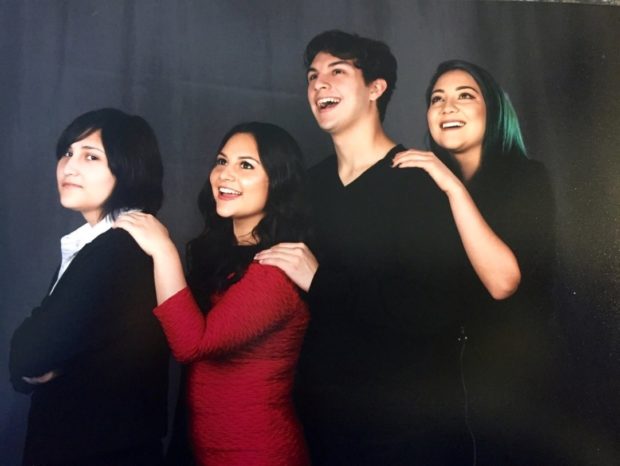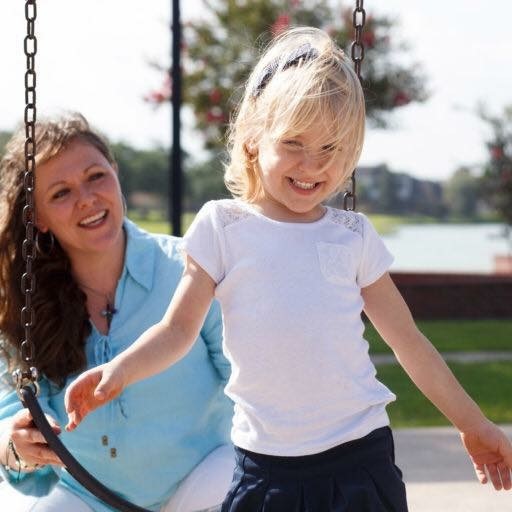Several transgender youth and their families shared their stories with the Supreme Court in a brief in support of transgender student Gavin Grimm, whose case will be heard by the Court at the end of March. Filed by Transgender Law Center and the law firm Cooley LLP, the brief represents PFLAG, Inc., Trans Youth Equality Foundation, Gender Spectrum Charitable Fund, and Gender Diversity — four organizations that work with transgender students and their families.
Meet the families of the brief below!
Honda-Phillips Family, California
“My husband and I never wanted our children to be anything other than themselves, and it hurts to think that our daughter lived so long as someone she didn’t feel she was inside. She isn’t pretending or wanting to be a girl: she is a girl. Her school, her classmates, and her teachers understand that and support her, and there are no issues – just normal school life with kids supported in learning, growing, and being themselves.” – Michelle Honda-Phillips, mom of 10-year-old M
Michelle says that M knew “a lot earlier than we did” that she was a girl. From the time she was very young, M would identify herself as a girl and would take on a daughter/sister role in play. When she was older, she would say things like, “Mom, you need to have another baby. You need to have another girl because we’re outnumbered three to two.” M formally transitioned on her eighth birthday. She has told most of her classmates that she is transgender and has explained to them what that means. She started at this school with a girl’s name and registered as a girl. It was “never a question” that she would use the girls’ restroom. “Everyone just knew that she would be using the girls’ bathroom because that’s what she is.” Michelle and Travis credit the “great” school principal and district superintendent with making it easy for M to use the restroom consistent with her gender identity.
Briggle Family, Texas
“I never cared when I was pregnant with him whether or not I was going to have a boy or a girl. I just wanted a healthy, happy, whole child. Literally nothing about Max has changed since the day he was born, except for the pronouns we use. If I didn’t care back then if I had a boy or a girl, why would it make any difference to me today? He’s still the same perfect, precious, miraculous baby I fell in love with 9 years ago. Only now he’s a boy.” – Amber Briggles, mom of 9-year-old Max
Amber and Adam Briggle live in Denton, Texas, with their nine-year-old son, Max, and four-year-old daughter. Max is transgender, and Amber recalls that he started expressing that he was a boy from the time he began forming sentences: “Around the age of two, I remember so clearly we were driving home from his preschool one day, and he had done something just really outstanding at school, and I said, ‘[Your teacher] said that you were such a good girl at school today. I’m so proud of you!’ He said, ‘No, Mom, I not a girl. I am boy.’” Amber tried to explain to Max that just because he didn’t want to play with “girl toys” didn’t mean he wasn’t a girl: “I told him that there’s lots of different ways that you can be a girl, and we’re going to redefine ‘girly’ together. And you can be any kind of girl you want to be, but you’re always going to be a girl.” At that time, “I didn’t think that he was transgender because I didn’t know what that was.”
When Max was around four, Amber realized that there might be something more going on: “We were in the car, and out of the blue, he said, ‘Mom, do you think scientists could turn me into a boy?’ . . . And that’s really when I started delving into research on gender expression in kids and gender nonconforming kids, again, not thinking that he was transgender, but just doing some research and reading, and just kind of learning more.”
Tapia Family, Wisconsin
“We are pretty much a regular family. We live openly. We are happy, free, and expressive. My son is a wonderful, aspiring, happy young man just trying to succeed like anyone else.” – Rose Tapia, mom of 17-year-old Jayson
Rose Tapia lives near Milwaukee, Wisconsin, and has five sons ranging in age from seven to 17. She describes herself as an “ordinary mom, a regular person.” Rose’s 17-year-old son, Jayson, is transgender. As a young child, Jayson refused to wear dresses and didn’t want any “girl” toys. When he was nine or ten, Rose found out he was telling children who did not attend his school that he was a boy. At twelve, J cut his hair short and asked for boxer shorts and boys’ clothing. When he was about fifteen, Jayson asked Rose to call him by a boy’s name and refer to him using male pronouns. “I didn’t always do it, because I was used to saying she,” explains Rose. “He was frustrated with me because I wasn’t taking him seriously and believing that that’s actually how he felt.”
The turning point for Jayson and Rose came during the summer that he turned 16. He had been “really upset and frustrated” and struggling in school. One night, he refused to come home from his girlfriend’s house. Rose immediately went to the house. After she arrived, Jayson’s girlfriend’s father told Rose that Jayson did not feel safe at home because his family called him “she” and continued to use his old name. “I didn’t realize how serious it was until that point,” recalls Rose. “And I felt like, oh my God, this is why my child is doing this.”
“My mom and I had a really difficult relationship for a long time,” says Jayson. “She struggled to understand and respect who I am. But after she saw how serious it was and how much it meant to me, she educated herself and we’ve come through it. We’re really close now.”
Hon Family, Illinois
“I just think that children need to feel safe and loved, and schools should be supportive, and not be a block to that. No parent should have to pull their child out of school because it is unsafe, and it’s not fair that my child lost the opportunity to go to school with her friends and experience those milestones because she was afraid to be in that unwelcoming environment.” – Monica Hon, mother of 18-year-old Heather
Monica and Jonathan Hon live in Ottawa, Illinois, a rural town in the Illinois Valley between Chicago and Peoria. They have four children ranging in age from 18 to 25, and their 18-year-old daughter, Heather, is transgender.
Monica and Jonathan were trying to keep Heather’s life as normal as possible, so they initially planned for Heather to attend the local high school. Monica spoke with the principal about how the school would handle Heather transitioning. The principal wanted Heather to use a separate bathroom from her peers and avoid locker rooms altogether by not taking gym class. Ultimately, because of the lack of support and their concern for Heather’s safety and well-being, Monica and Jonathan decided to enroll Heather in a homeschool program.
Shappley Family, Texas
“I am a Christian. I am a Bible-believing Christian. I love the Lord. But God makes no mistakes, and my child is fearfully and wonderfully made, just as the Scripture tells us. Being transgender doesn’t make her less fearfully and wonderfully made.” – Kimberly Shappley, mom of six-year-old Kai
Kimberly Shappley lives in Pearland, Texas, a small town outside of Houston, which she describes as “ultra-conservative.” Kimberly was born in Alabama and raised in Mississippi. She is an evangelical Christian, a full-time nursing student, and an ordained minister. Her six-year-old daughter, Kai, is transgender.
From the age of two, Kai showed signs that she identified as a girl. At first, Kimberly tried to force Kai to act more like a boy and would punish her, even at times spanking her, whenever she acted like a girl. On several occasions, Kimberly demanded that Kai admit she was a boy, but Kai would still cry, “[Y]ou know, Mommy, you know I’m a girl!” Looking back, Kimberly recognizes that Kai “always knew who she was.” She regrets her attempts to force Kai to live as a boy and explains that she did not know what else to do, especially in the face of family and community pressure to “do something” about Kai’s girly behavior.
Kimberly says, “I used to listen to other mothers of transgender children say, ‘I just want my child to be happy,’ and in my self-righteous mind I would think, ‘It’s not about your kid being happy. You need to train your child in the ways of the Lord and be a better mom.’ But what I saw in my child when she was finally allowed to wear girls’ clothing, was this joy and this peace I had never seen in this child. I realized it’s not about ‘I’m going to give you these to make you happy,’ it’s about my child had never truly been happy before.”
Maines Family, Maine
“Nicole is probably one of the strongest people I’ve ever met who is also still one of the most vulnerable, and has had to deal with so much that it has just made me a better person, a better father, and a better husband to be around her . . . a better American. They want to grow and be successful and productive Americans, and it’s that simple. It’s not just about the bathrooms. Every child has the right to the same educational experience.” – Wayne Maines
Wayne and Kelly Maines live in Portland, Maine. Wayne is an Air Force veteran and the Executive Director of Safety and Environmental Management at the University of Maine. Kelly is an Executive Assistant to the Cumberland County Sheriff. Wayne and Kelly have 19-year-old identical twins, Jonas and Nicole. Their daughter, Nicole, is transgender.
A pivotal moment for Wayne occurred when Nicole was around nine. By this time, Nicole had already gradually transitioned at school, but Wayne still had not completely accepted that he had a daughter and son rather than twin sons. Wayne recalls taking both children to Walmart and grabbing Jonas’s hand when they got out of the car. Jonas pulled away. Nicole, however, grabbed her father’s hand, and they swung their arms “all the way into the store.” Wayne explains: “It hit me like a ton of bricks. I [have] a beautiful daughter . . . she’s going to hold my hand until I die.”
Nearly ten years ago, the Maines family was unintentionally thrust into the public eye as the result of a long-fought battle with Nicole’s school. Nicole’s school district would not let her use the girls’ restroom and assigned her a ‘bodyguard’ not to protect her, but to prevent her from trying to use the girls’ restroom. Wayne and Kelly sued the school district and after years of litigation, the Maine Supreme Court found that the school district violated the Maine Human Rights Act by prohibiting Nicole from using the girls’ restroom.

